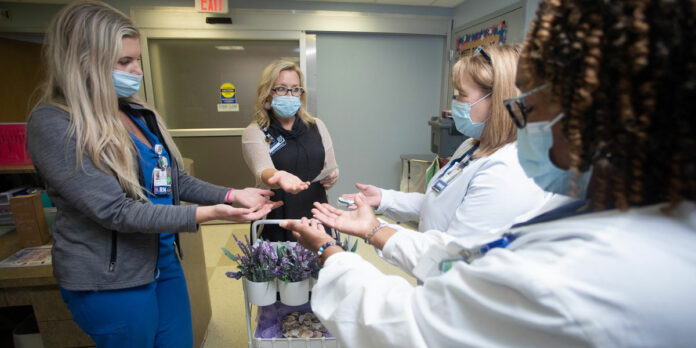“To become a nurse, you have demonstrated that you are good at enduring stressful situations,” said Catherine Gaudet, M.S.N., RN, CNL, a clinical nurse leader at the hospital and a co-champion of a new pilot program to prevent and address burnout among nurses. “Stress can be necessary and helpful, but if stressors are not dealt with effectively, long-term mental and physical impacts can occur.”
Gaudet explains the concept behind Stress First Aid, a peer support framework first developed for the U.S. Navy and now the basis of the three-year pilot being implemented at four healthcare sites in the nation, including University Hospital, part of USA Health, the University of South Alabama’s health system. It is funded by a grant from the American Nurses Foundation, the philanthropic arm of the American Nurses Association, and the United Health Foundation.
“Stress First aid is a set of knowledge and skills that we use every day to gain control of our experiences with stress,” she said.
Research shows that nurses nationwide have faced unprecedented stress and burnout in the wake of the COVID-19 pandemic. In the Foundation’s Pulse on the Nation’s Nurses Survey, conducted in November 2022, 64% of respondents said they felt stressed, 60% said they were frustrated, and 57% reported feeling exhausted.
The pilot program is designed to identify and reduce stress reactions before they develop into lasting issues. It goes beyond identification of burnout to intervention, by helping nurses speak about their stress/burnout using a common language, normalize talking about it and provide support to their peers.
“We are honored to join this pilot program by the American Nurses Foundation and extend our commitment to our employees to build a supportive and healthy work environment,” said Shannon Scaturro, M.S.H.A., M.S.N., CRNA, FACHE, chief operating officer for USA Health and assistant vice president for medical affairs. “Our participation in this program will help give us the tools and resources to better support our caregivers who have been under incredible stress serving our community. As an organization, we are committed to improving the lives of those in our community and the lives of our caregivers.”
Sherry Fryman, RN, M.S.H.A., chief nursing officer for University Hospital, said the pandemic added a layer of psychological stress to a job that had always been stressful. “Now that the immediate threat has resolved, nurses are emotionally drained and experiencing burnout at a very high rate. It is important that they take the time to focus on their own mental and physical well-being,” Fryman said. “To help them, we need to create a sense of community and provide nurses with emotional resources so they can feel empowered and supported.”
The pilot program is unique in that it also emphasizes and validates the voices and needs of Millennial and Generation Z nurses as well as nurses of color to ensure their experiences are recognized and addressed, the Foundation said. Lessons learned from the program will be incorporated into a national awareness campaign.
Stress First Aid introduces a scale – green, yellow, orange and red – to describe stress levels. It trains nurses to recognize the signs of stress injury in themselves and their colleagues and to respond with support and resources. Green indicates wellness, while red, the highest risk, reflects depression and anxiety.
“By giving stress a color, we allow nurses to express where they feel they are at on the ‘stress continuum’ without assigning any blame or shame for feeling stress,” said Amy Campbell, D.N.P., RN, assistant professor in the USA School of Computing and a co-principal investigator on the project. “Similarly, this language also allows their peers to immediately identify steps they can take to better support a peer in distress.”
Other health systems in the program include BayCare Health in Tampa Bay, Florida; Indiana University Health in locations throughout Indiana; and Atrium Health Wake Forest, Winston-Salem campus in North Carolina.
“Participating in this pilot project demonstrates that we value our nurses as individuals. Their well-being matters,” said Kristen Noles, D.N.P., CNL, performance improvement manager for USA Health and a co-principal investigator on the program. “Without nurses, we can’t take care of patients.”
At University Hospital, the program is still in its early stages. Gaudet and another champion, Chris Clark, RN, a clinical nurse leader on the ninth floor of University Hospital, are training nurses in their units and gathering ideas for a special room that can provide stress-relief activities. They will train nurses how to respond to others in stress, including observing and listening, getting help or covering someone’s duties while they take a break. The idea is to restore effectiveness, self-esteem and hope.
Back in the conference room, the new nurses jot down their ideas for a “decompression room” on index cards, as other nurse manager champions, Matthew Reed, RN, and Sarah Gates, RN, look on. Then they are asked to share the ways they cope with stress.
Preston Phillips, RN, says he spends time in a room with low lighting. Garrett Deakle, RN, says he chooses exercise, such as running. Morgan Howard, RN, gets in her car and turns up the music.
The eight are among about 40 nurses working in the medical ICU. They are caring for patients with heart failure, kidney failure or respiratory failure and those recovering from open heart and bypass surgeries. Stress levels can vary widely depending on the day’s events.
“This program gives you the ability to identify what stress level you’re in and, more importantly, what stress level your co-workers are in. It lets us take the temperature of the unit,” Clark said. “It’s a learning language, so we can help each other.”
(Courtesy of the University of South Alabama)
Don’t miss out! Subscribe today to have Alabama’s leading headlines delivered to your inbox.
